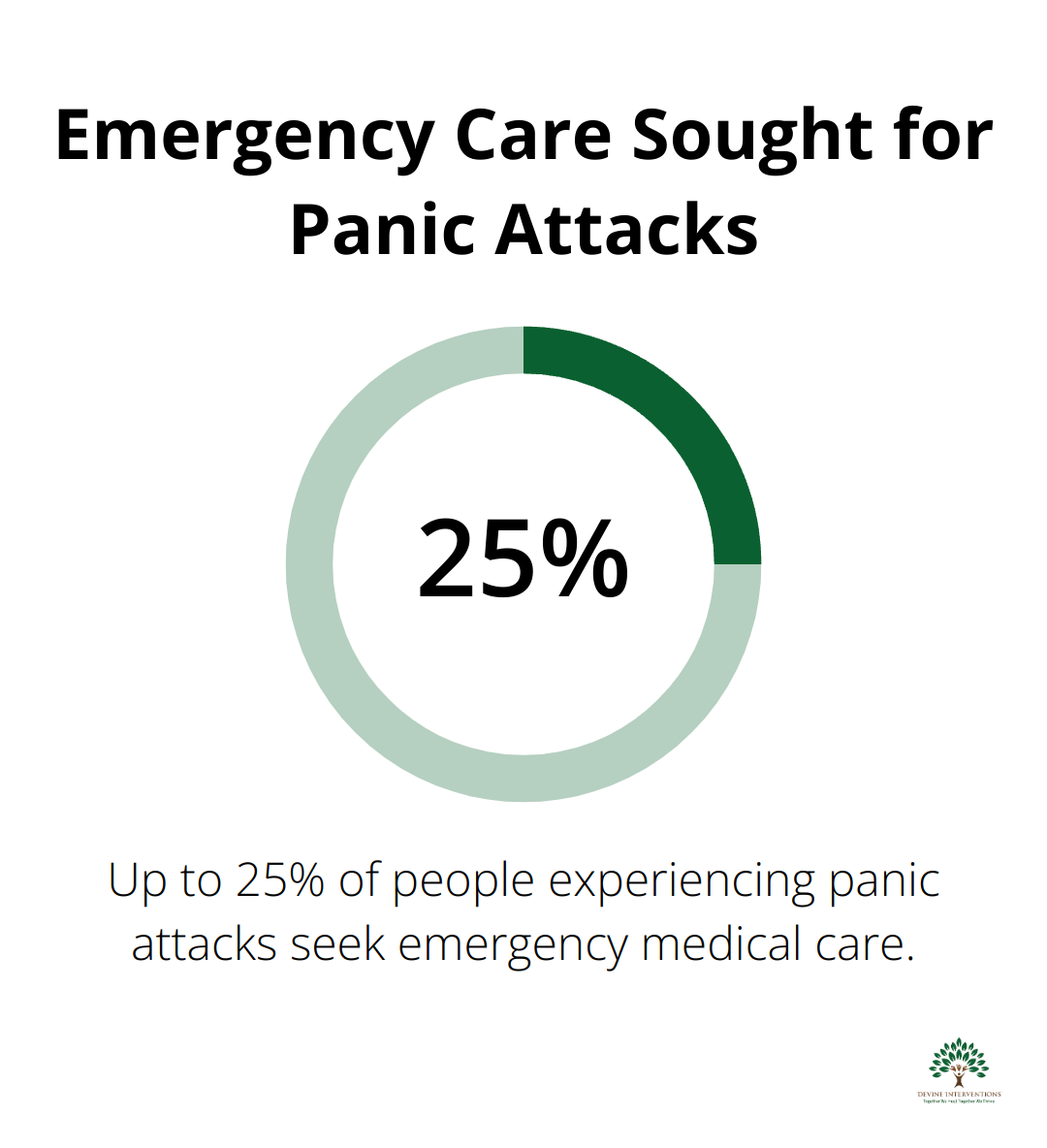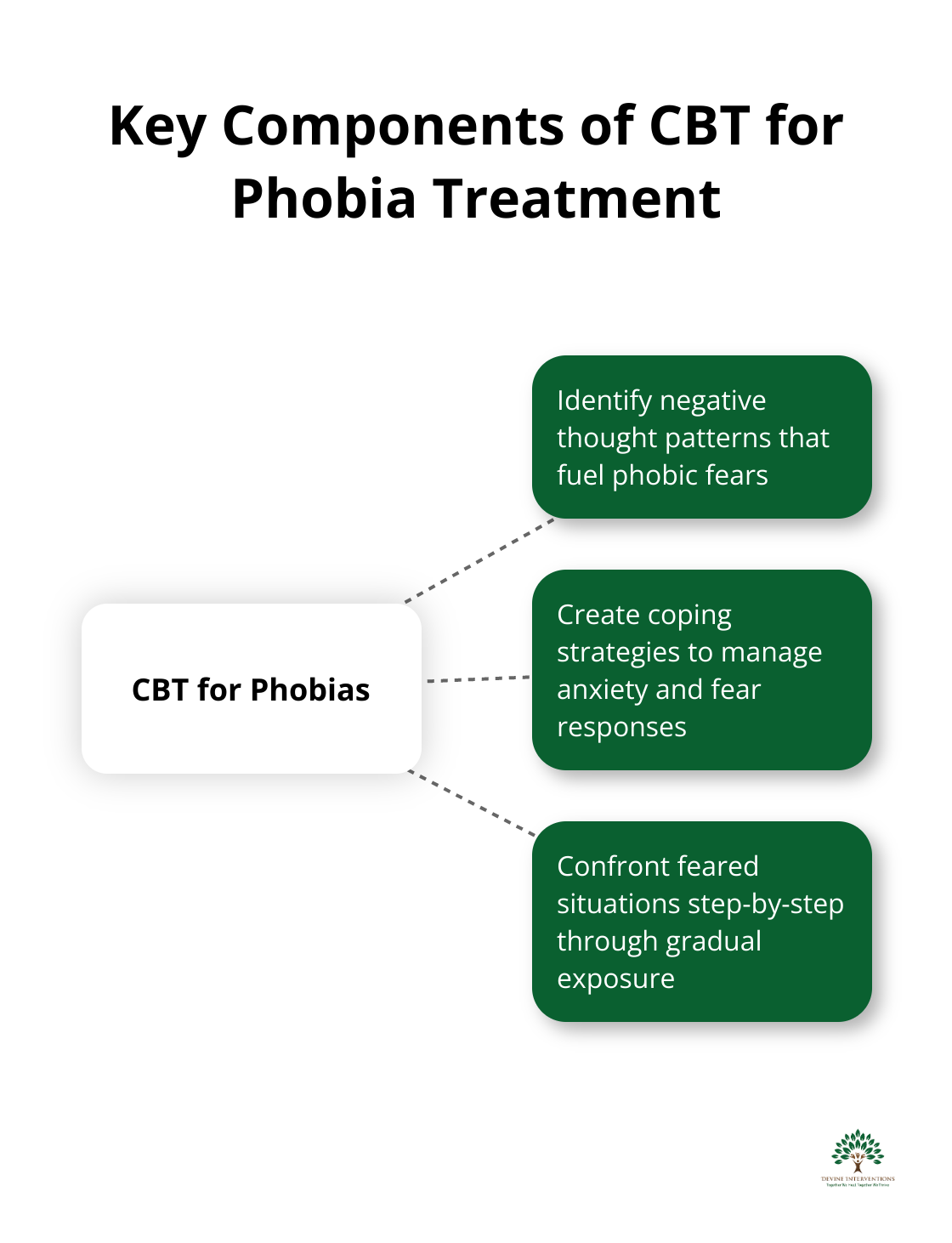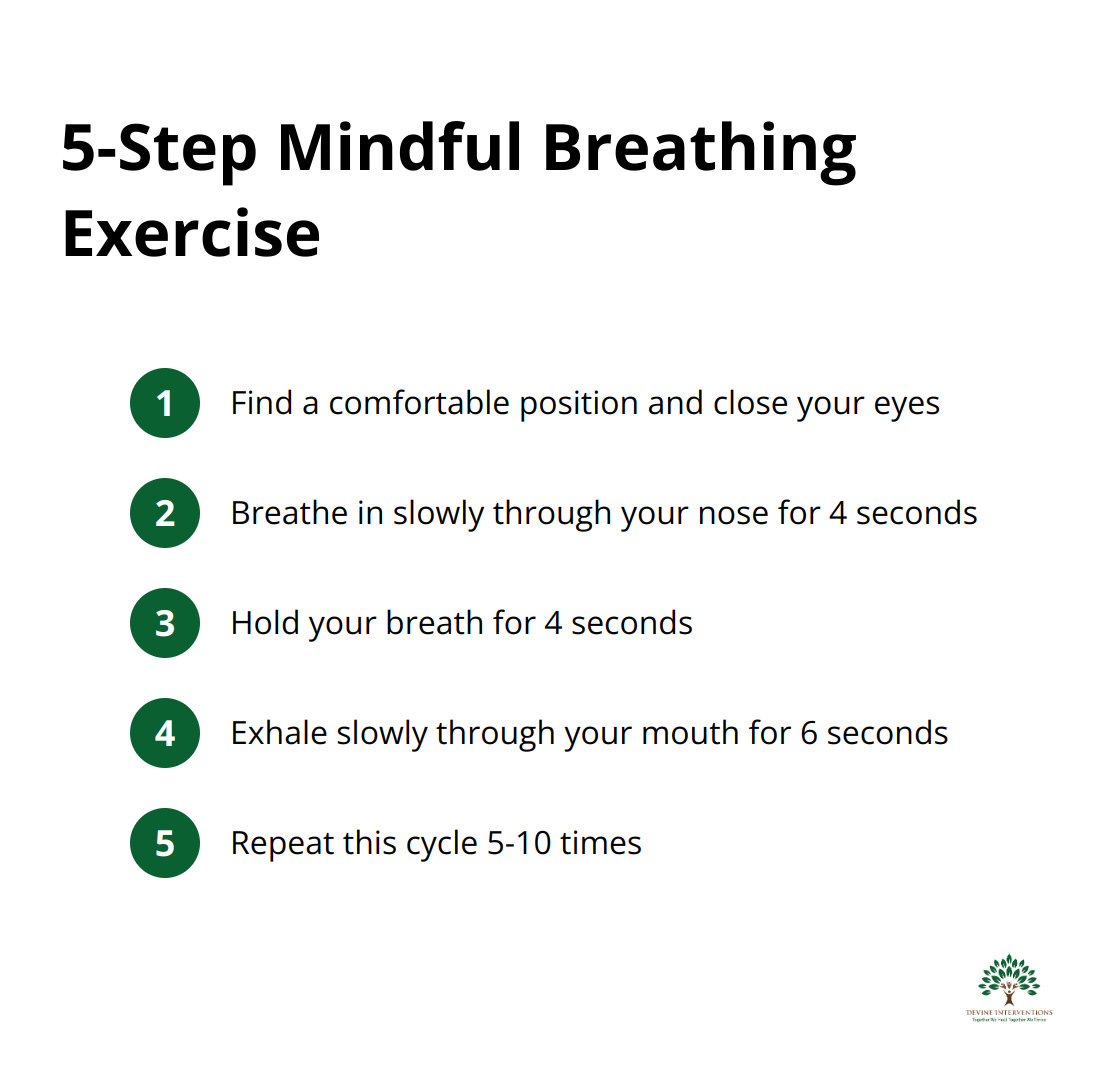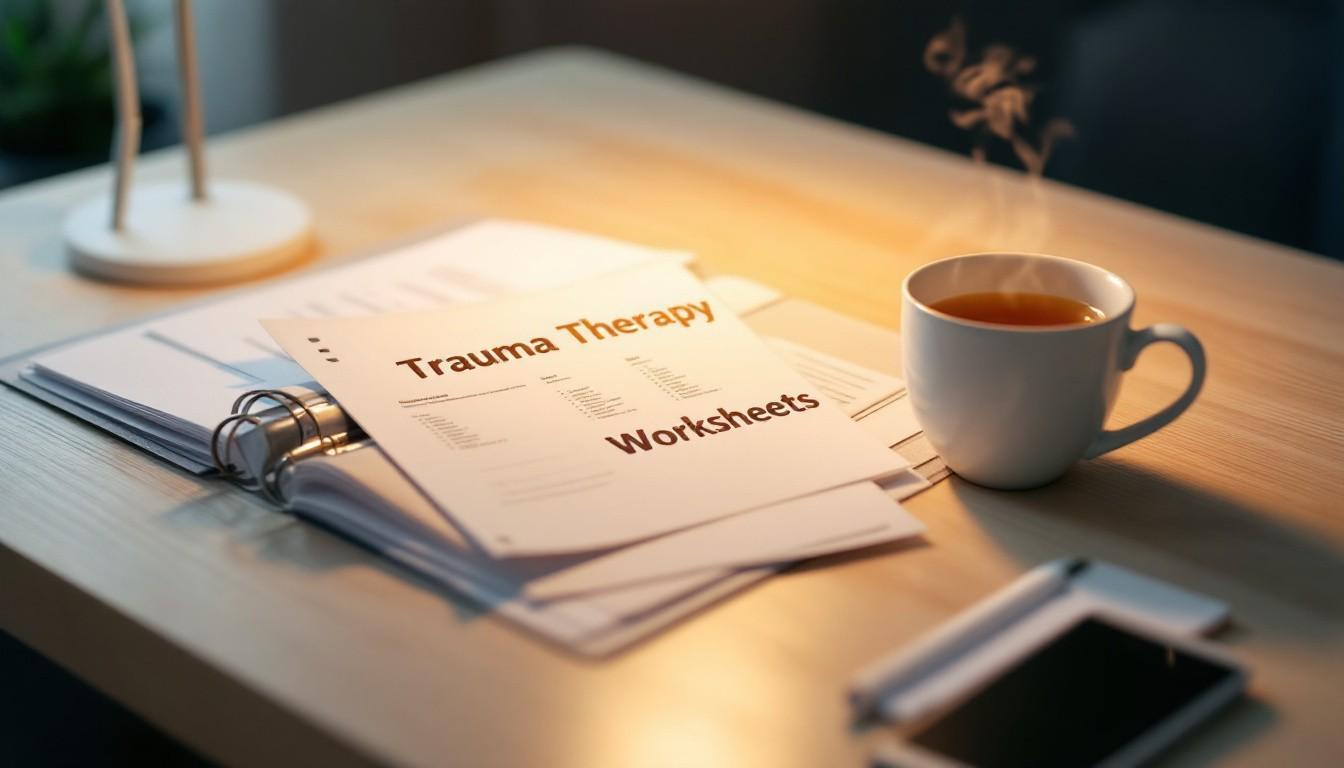Phobias can be overwhelming, affecting every aspect of daily life. At Devine Interventions, we understand the challenges these intense fears present.
Our team is dedicated to helping you overcome phobias and regain control. This guide explores effective treatments and self-help strategies to manage your fears.
What Are Phobias and How Do They Affect Us?
Understanding Phobias
Phobias are more than just fears. They’re intense, irrational anxieties that disrupt daily life. These overwhelming fears impact lives and relationships significantly.
Types of Phobias We Encounter
Phobias manifest in various forms. Some common types include:
- Agoraphobia: Fear of open or crowded spaces
- Social phobia: Intense anxiety in social situations
- Specific phobias: Fears of particular objects or situations (like heights or spiders)
Recognizing Phobia Symptoms
Phobias often trigger physical and emotional responses. Common symptoms include:
- Rapid heartbeat and sweating
- Shortness of breath
- Trembling or shaking
- Intense desire to escape the situation
These symptoms can be severe. The Anxiety and Depression Association of America notes that up to 25% of people experiencing panic attacks (which phobias can trigger) seek emergency medical care, mistaking their symptoms for a heart attack.

The Real-Life Impact of Phobias
Phobias don’t just affect individuals; they ripple through every aspect of life. They can:
- Limit career opportunities (e.g., fear of flying affecting job prospects)
- Strain relationships (avoiding social gatherings due to social phobia)
- Reduce quality of life (missing out on experiences due to specific fears)
Breaking the Cycle of Avoidance
Many people with phobias resort to avoidance as a coping mechanism. While this provides short-term relief, it often reinforces the fear long-term. Effective treatment involves gradually facing fears in a controlled, supportive environment.
Understanding phobias marks the first step towards effective management. If you struggle with a phobia, know that help is available. Professional support can guide you through overcoming these intense fears and reclaiming your life. The next section will explore effective treatment approaches that can help you on this journey.
How Devine Interventions Treats Phobias
At Devine Interventions, we offer a comprehensive approach to phobia treatment. Our methods stem from evidence-based practices and adapt to each individual’s needs.
Cognitive Behavioral Therapy: Reshaping Thought Patterns
Cognitive Behavioral Therapy (CBT) stands as our primary tool for addressing phobias. This approach helps you identify and challenge the irrational thoughts that fuel your fears. In CBT sessions, we collaborate to:

- Identify negative thought patterns
- Create coping strategies
- Confront feared situations step-by-step
Research supports CBT’s effectiveness in phobia treatment.
Exposure Therapy: Confronting Fears Systematically
Exposure therapy forms a key component of our phobia treatment. This technique involves a gradual and safe confrontation of your fears. We might start with imaginal exposure, progress to viewing pictures, and ultimately encounter the fear in real life.
For instance, if you fear flying, we could begin by discussing air travel, advance to watching videos of planes, and eventually visit an airport. This methodical approach reduces anxiety over time.
Medication: A Complementary Tool
While therapy remains our primary focus, medication can support the management of phobia symptoms. Our psychiatric providers offer comprehensive medication management, carefully weighing each client’s unique needs.
We might prescribe medications like selective serotonin reuptake inhibitors (SSRIs) or beta-blockers to help manage anxiety symptoms. However, we always discuss potential benefits and risks before initiating any medication regimen.
Personalized Treatment Plans
At Devine Interventions, we believe in a holistic approach to phobia treatment. Our team works closely with you to develop a tailored treatment plan that addresses not just your phobia, but your overall well-being.
Ongoing Support and Adjustment
Treatment doesn’t end after a few sessions. We provide ongoing support and adjust your treatment plan as needed. This flexibility ensures that you receive the most effective care throughout your journey to overcome your phobia.
Our commitment to comprehensive care extends beyond the treatment room. In the next section, we’ll explore self-help strategies that complement professional treatment and empower you to manage your phobia in daily life.
How to Manage Phobias at Home
At Devine Interventions, we empower our clients with tools for use outside therapy sessions. While professional treatment is essential, self-help strategies can boost your progress in managing phobias.
Master Mindful Breathing
Mindful breathing is a powerful technique for managing phobia-related anxiety. This simple method calms your nervous system when faced with triggering situations. Try this quick exercise:

Regular practice (even when you’re not anxious) will make this technique easier to use when you need it most.
Develop a Fear Ladder
Gradual exposure is key to phobia treatment. Start this process at home by creating a fear ladder. List situations related to your phobia, ranking them from least to most anxiety-provoking. Begin with the least scary scenario and work your way up.
For example, a fear ladder for dog phobia might look like this:
- Look at pictures of dogs
- Watch videos of dogs
- Observe dogs from a distance in a park
- Stand near a calm, leashed dog
- Pet a friendly dog
Stay in each situation until your anxiety decreases. This process helps your brain learn that the feared object or situation isn’t as dangerous as perceived.
Strengthen Your Support Network
A strong support system makes a significant difference in managing phobias. Share your struggles and goals with trusted friends and family members. They can offer encouragement, accompany you during exposure exercises, and provide a safe space to discuss your progress.
Consider joining a support group for people with similar phobias. Sharing experiences and coping strategies with others who understand can be incredibly empowering (and often leads to lasting friendships).
Implement Relaxation Techniques
In addition to mindful breathing, other relaxation techniques can help manage phobia-related anxiety:
- Progressive Muscle Relaxation: Tense and relax different muscle groups systematically.
- Guided Imagery: Visualize calming scenes or situations.
- Meditation: Practice mindfulness to stay present and reduce anxiety.
These techniques (when practiced regularly) can provide relief during stressful situations.
Track Your Progress
Keep a journal to monitor your phobia management journey. Note your fears, anxiety levels, and successful exposures. This practice helps you recognize patterns and celebrate small victories (which are crucial for motivation).
While these self-help strategies are powerful tools, they work best when combined with professional treatment. If you struggle with a phobia, reach out to our team at Devine Interventions. We’re here to support you every step of the way on your journey to overcome your fears.
Final Thoughts
Phobias can overwhelm, but they don’t have to control your life. At Devine Interventions, we offer a comprehensive approach to phobia treatment that combines evidence-based therapies with compassionate care. Our team of experienced professionals uses Cognitive Behavioral Therapy, exposure techniques, and medication management to help you overcome your fears.
We understand that seeking help for phobias can be daunting. However, taking the first step is important for reclaiming your life and well-being. Our treatment options at Devine Interventions are tailored to meet your unique needs (including various levels of care from intensive outpatient programs to individual therapy sessions).
If you want to take control of your phobias, we’re here to support you. You can reach out through our website or call us to schedule an initial consultation. During this consultation, we’ll assess your needs, discuss your concerns, and develop a personalized treatment plan to help you achieve your goals.







